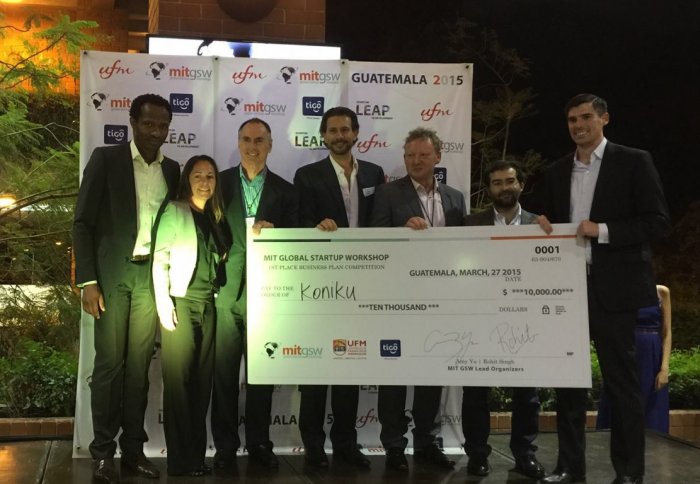By Helen Figueira
May 1, 2015
Time to read: 4 minutes
Deborah Oakley
A PhD student is aiming to radically improve the success rates of clinical trials through a start-up company based on his research.
Oshiorenoya Agabi, a final year PhD student working at Imperial College and the Clinical Sciences Centre in West London, is leading an international team to the semifinals of the annual start-up competition MASSChallenge next week. Agabi will pitch Koniku – a startup company he founded during his time at Imperial.
Koniku is an online platform which models neurodegenerative disorders such as Alzheimer’s, Multiple Sclerosis, and Parkinson’s disease and predicts the effects of drugs which could be used to treat them.
The research draws on Oshiorenoya’s PhD research on improving signal to noise ratio during live imaging of brain activity and also studying the functional stability of neurons with imaging tools, taken under the supervision of Dr Simon Schultz . Koniku aims to provide a digital system that allows drug developers to replicate human organ-drug interactions. The system aims to speed up the development of drug therapies to treat debilitating diseases by providing pharmaceutical companies with better insight into how their drug candidates will perform in human clinical trials.
Oshiorenoya said: “Bringing a new drug to market is an incredibly long and expensive process, and unfortunately many drugs fail once they reach human clinical trials. Such a failure can effectively wipe out years of development and millions of dollars of investment. For this reason the drug development process has become an economic game – pharmaceutical companies tend to focus on drugs that they know they’ll get a good return on. Koniku aims to streamline this process, reduce costs and improve success rates.”

MASSChallenge is the world’s largest startup competition and incubator. With programs in Boston, Israel and the UK, it provides entrepreneurs with mentorship, office space, education, access to a vast network, and other resources during four months of concept acceleration.
Oshiorenoya, along with Koniku team members Christina Salys and Chris McAndrew from UCLA Anderson and Laura Brightmann and Mark Brown from the University of Cambridge, were fast tracked to MASSChallenge as a result of their success earlier this month at the MIT Global Startup Workshop (MIT GSW). The competition, which was born from the MIT $50K (now $100K) competition, is dedicated to fostering entrepreneurship across the globe.
This year the MIT GSW competition was hosted by Universidad Francesco Marroquin in Guatemala. Finalists were given five minutes to present their plans followed by a three minute Q&A session with the judging panel. Koniku took home the two top prizes, including $10,000 in the Business Plan Competition and $2,000 in the Elevator Pitch Competition.
Oshiorenoya added: “We were honored by the awards. If someone would have told me that we’d have won the two top prizes at such a prestigious competition, and that we’d be taking our idea to MASSChallenge this year, I never would have believed them, I’m blown away.”
“I’m really grateful to my supervisor Simon Schultz and the support I’ve had from Dr Vincenzo de Paola,” said Oshiorenoya, speaking about his work at Imperial College and here at the CSC within the Neuroplasticity and Disease group. “There is a real culture of entrepreneurship here, and an enthusiasm among the College community for what can be achieved. This really gives you the drive to take your idea forward.”
For further information, get in touch:
Susan Watts
Head of Public Engagement and Communications
MRC Clinical Sciences Centre
Du Cane Road
London W12 0NN
T: 0208 383 8247
M: 07982 142327
E:
Deborah Oakley
Science Communications Officer
MRC Clinical Sciences Centre
Du Cane Road
London W12 0NN
T: 0208 383 3774
E:
This news story first appeared on Imperial College London’s website and was initially produced by Deborah Evanson from the Communications and Public Affairs Department.